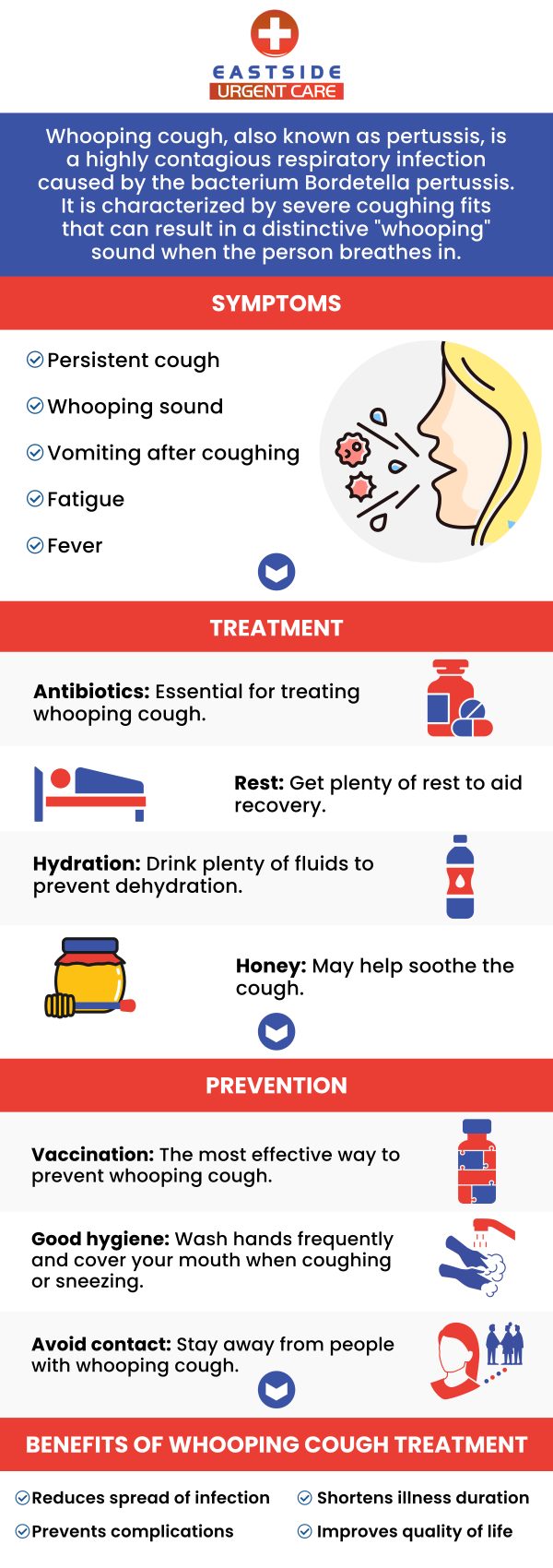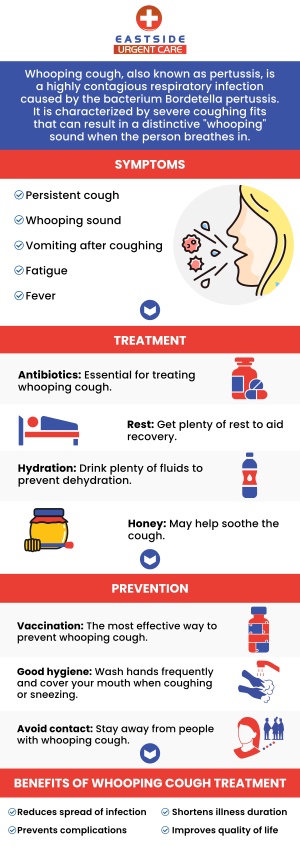Whooping Cough Treatment Specialist in Cincinnati, OH
If you are noticing signs of a persistent and consistent cough, and your face turns red or blue while coughing, you might be experiencing whooping cough. The early symptoms of whooping cough such as runny nose, sore throat, coughing, watery eyes, and mild fever are similar to the usual cough. However, after a week or two, you might experience rapid and violent coughing fits. If you are looking for whooping cough treatment, visit Eastside Urgent Care in Cincinnati, OH. For more information, contact us or book an appointment now. You can visit us at 872 Ohio Pike Cincinnati, OH 45245.




Table of Contents:
How do you know if you have whooping cough?
What are the 3 stages of whooping cough?
Will whooping cough go away by itself?
When to see a doctor for whooping cough?
Whooping cough is an incredibly contagious respiratory infection that is caused by a specific bacteria attaching to part of the lining of our upper respiratory systems. Though the infection is more of an inconvenience and incredibly uncomfortable for adults and adolescents, it remains a massive health risk to young children and babies so it is important to be aware of the symptoms and to ensure that you and your entire family are properly vaccinated.
It can be tricky distinguishing between symptoms of whooping cough and a normal cold, as the symptoms will typically start as fairly similar in the early stages of the virus. Some first symptoms may include a runny nose, sore throat, coughing, watery eyes, and a mild fever. These symptoms may have a duration of around one week. After the first week or two of having whooping cough, many people will develop paroxysms, which are rapid and violent coughing fits. These uncontrollable coughing fits can happen randomly over the next few weeks and generally become worse and more frequent as the illness continues.
The coughing fits can cause people to make a high-pitched “whooping” noise at the end of the fit, or even vomit during or after a really bad coughing fit. Though patients may frequently struggle to breathe, between coughing fits they may seem as if they are seemingly well. Adults and adolescents will have less severe symptoms, whereas babies and children can experience much worse symptoms. Many babies will not cough at all but will experience much more of a struggle with regular breathing. The symptoms are also much less serious for those who have been vaccinated against whooping cough.
The first stage of whooping cough is when a patient will experience early symptoms that are similar to a normal cold. This stage typically only encompasses the first week or two of the illness and is not often diagnosed as whooping cough since the symptoms appear to be so mild and cold-like.
The second stage of whooping cough is when the illness is more easily diagnosed as the severe symptoms associated with the illness start to develop. These “later” symptoms essentially consist of rapid, uncontrollable, and violent coughing fits. These fits are considered more severe because they cause the patient to struggle with breathing and are considered incredibly uncomfortable for their entire duration.
This stage will most often last for around 1 to 6 weeks but can last up to 10 weeks for more severe cases.
The third stage of whooping cough is also known as the recovery stage. This is the stage in which the coughing fits caused by the illness will become less and less frequent and milder. The coughing fits may stop but reappear if the patient develops any other respiratory infections for months after the other symptoms of whooping cough have dissipated. The recovery stage will typically last for 2 to 3 weeks other than the coughing that may appear due to other respiratory illnesses. This stage is very gradual until all symptoms have been completely eradicated.
The only way that medical professionals are able to treat whooping cough is if it is diagnosed within three weeks of the initial infection, in which case, you will be prescribed antibiotics in the hope that it will reduce symptoms and help stop the spread of the infection to others. After that three-week mark, you are no longer contagious and antibiotics will no longer be useful in the reduction of symptoms. At this point, the symptoms will most likely eventually go away on their own as you slowly recover.
It is recommended that anyone who is experiencing a cough that lasts longer than one week schedule an appointment with their health care provider. The first couple of weeks are when the infection is the most contagious, so receiving an accurate and early diagnosis is vital to ensure proper treatment and minimize the risk of the infection spreading to other members of the household. Any close contact with young children should be avoided entirely wherever possible.
Seek immediate medical attention if the coughing spells are causing you or your child to vomit, turn red or blue, struggle with breathing, or inhale what sounds like a “whooping” noise. If you are looking for whooping cough treatment, visit Eastside Urgent Care in Cincinnati, OH. For more information, contact us or book an appointment now. You can visit us at 872 Ohio Pike Cincinnati, OH 45245. We serve patients from Cincinnati OH, Covedale OH, Delhi OH, St Bernard OH, Wilders KY, and Elmwood Place OH.
Check Out Our 5 Star Reviews


Additional Services You May Need
▸ Asthma
▸ Bronchitis
▸ DOT Physical
▸ Employment Drug Screen
▸ Illness
▸ Injury
▸ Insect and Animal Bites
▸ Occupational Medicine
▸ Pediatric Visit
▸ Pre-OP Physical
▸ School & Sports Physicals
▸ STD And Treatment
▸ Rash/Allergic Reaction
▸ Stomach Flu Treatment

Additional Services You May Need
▸ Asthma
▸ Bronchitis
▸ DOT Physical
▸ Employment Drug Screen
▸ Illness
▸ Injury
▸ Insect and Animal Bites
▸ Occupational Medicine
▸ Pediatric Visit
▸ Pre-OP Physical
▸ School & Sports Physicals
▸ STD And Treatment
▸ Rash/Allergic Reaction
▸ Stomach Flu Treatment



